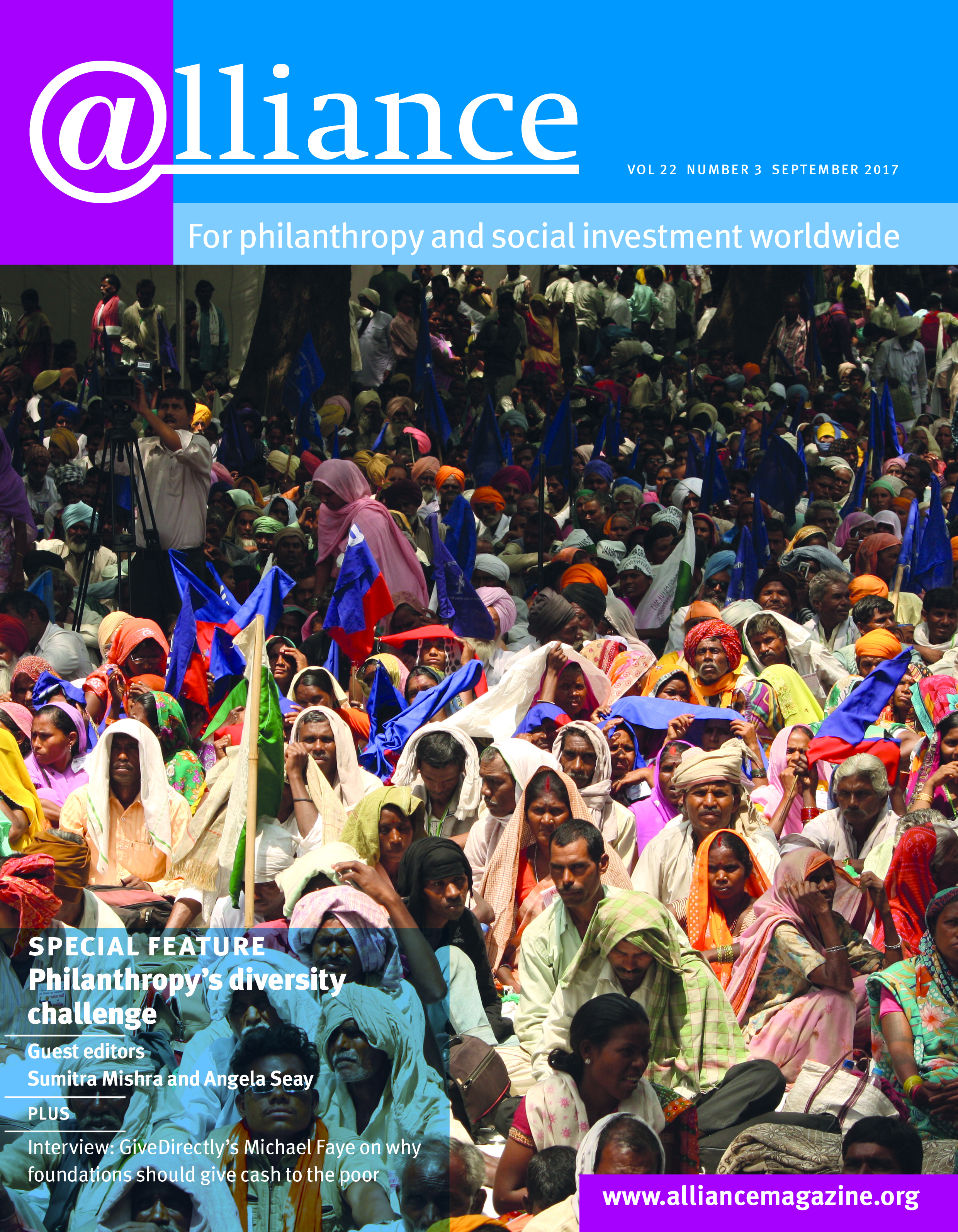‘Nothing about us without us’ was a slogan coined by disability rights activists to communicate the idea that no policy should be decided by any representative without the full and direct participation of members of the group(s) affected.
Many working in philanthropy would be sympathetic to this principle. Being in touch with the people you aim to serve is not just a sound moral imperative but also likely to make an effective philanthropic strategy. A lack of diversity on boards and at staff level ‘probably limits their intelligence about what is happening on the ground’ notes European Foundation Centre chief executive, Gerry Salole, who suggests that foundations would be well advised to ‘reflect the streets’.
Yet, judging by the contributions to this issue, philanthropy’s own workforce remains dogged by a lack of diversity, representation and inclusion. Gaps between richer/whiter people (the foundations) and poorer/darker people (the beneficiaries) emerge strongly in the issue.
Some will shrug their shoulders and say: ‘so what?’ After all, society gives philanthropy freedom to decide how to allocate resources without telling it who should be employed to do the job. Moreover, institutional philanthropy is a product of the privately accumulated wealth of elites – it’s an ‘elitist sport’, as Salole put it in an Alliance interview last year.
A central question, then, is how to reconcile philanthropy’s elitism and relative freedom on the one hand with a case for democratizing it on the other?
This is the challenge examined in our special feature. Our guest editors and contributors offer perspectives from India, Indonesia, South East Asia, Europe and the US. They document the lack of diversity in foundations, why they see this as problematic, and what they think should be done. There are some bold and provocative proposals.
Their challenge to philanthropy is: if you want to do the most good, you need to reflect the make-up of wider society. To an alarming number of its own practitioners, philanthropy simply appears out of touch.
While our guest editors and some contributors are optimistic that progress can be made, I’m more sceptical. Rather than trying to make philanthropy something it’s not, maybe it’s time to acknowledge that philanthropy’s make-up might be a symptom of society’s most pressing challenges as much as a solution to them.
I invite you to join the debate.



Comments (0)
Yes, I fully support the need to more fully identify and replace currently experienced baselines of family separating, adolescent malnutrition, disease, death, and 60 to 75% unemployed youth within developing countries struggling with their impoverished, laborious and failing agronomic applications by small holder farmers who provide 100% of their domestic foods and 90% (??) of the global food supply. I am excited by many of the foundations, world and country banks, and national governmental AID programs addressing the need to focus on long-term proven technologies that enable domestic, community, and national successful opportunities well beyond repeated gifts that enable some to profit, while little trickles into the smallholder farm communities. Parallel with these tragedies, the majority of difficulties experienced daily by smallholder farmers remain unaddressed by a majority of individuals who have yet to visit and live with these 90% food suppliers (??). Identifying new long-term agricultural technologies improving food production 3 to 10-fold with less water, greater crop resilience to changing climates while soil sequestering huge volumes of Greenhouse Gases (GHG) that also leads to greater access to loans, crop insurance and national research of long-term family, community and national developments. For more than 57 years of agronomic research, training literally hundreds of national and international graduate students at Michigan State University, the professional collaborations with national international agencies, governments, and graduate schools to establish and strengthen global and local governments in struggling countries. Completing agronomic research on small holder farms shared with at least 59 countries, I strongly support funding of essential newly integrated long-term successful agronomic, electrical, digital, water and health technologies integrated with educational technology communities designed to promote specific unified effort by local co-ops designed to introduce and further develop family and community adoptions of new long-term technologies designed to progressively develop successful economic and healthy agricultural production, storage and profitable communities, industrial regions and peaceful nations.